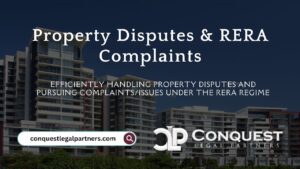Property disputes in India can be diverse and complex due to the intricacies of property laws and the varying nature of disputes. Here are some common types of property dispute matters in India:
1. Ownership Disputes:
Ownership disputes arise when there is a disagreement over the rightful ownership of a property. These disputes may involve disputes over title, possession, or claims of adverse possession.
2. Partition Disputes:
Partition disputes occur when co-owners of a property seek to divide or separate their shares in the property. Disagreements can arise over the division of property, valuation, or the right to occupy specific portions.
3. Encroachment Disputes:
Encroachment disputes arise when a person or entity occupies or uses a portion of a property that belongs to another without legal authorization.
4. Tenancy Disputes:
Tenancy disputes involve conflicts between landlords and tenants regarding issues like rent, eviction, maintenance responsibilities, and the terms of the lease agreement.
5. Fraud and Forgery:
Disputes related to fraud and forgery may occur when someone forges property documents or uses fraudulent means to transfer ownership without the rightful owner’s knowledge or consent.
6. Inheritance and Succession Disputes:
These disputes arise when there is disagreement among family members regarding the distribution of the deceased person’s property or challenges to the validity of the will.
7. Easement and Right of Way Disputes:
Easement disputes involve disagreements over rights of passage, access, or use of a property by another party.
8. Boundary Disputes:
Boundary disputes occur when there is a disagreement over the exact location of property boundaries, leading to conflicts with neighboring properties.
9. Illegal Constructions:
Disputes may arise due to unauthorized or illegal constructions on a property that violate building codes and regulations.
10. Mortgage and Loan Disputes:
Mortgage disputes can arise when there are disagreements between lenders and borrowers regarding loan terms, defaults, foreclosure, or repossession of the property.
11. Development and Construction Disputes:
These disputes involve conflicts between property developers, buyers, and local authorities over issues like construction delays, quality of construction, amenities, and adherence to building regulations.
Property disputes can be resolved through various legal mechanisms, including negotiation, mediation, arbitration, or litigation. Seeking legal advice and guidance is crucial in such matters to understand the rights and remedies available under the relevant property laws in India.
B. RERA Complaint
—Allottees or home buyers of real estate often face various problems and challenges throughout the property buying process and even after possession. Some common problems faced by allotees/home buyers of real estate include:
1. Delayed Possession:
One of the most prevalent issues is the delay in the possession of the property. Developers may fail to complete the project on time, causing inconvenience and financial strain to home buyers who were expecting timely possession.
2. Construction Quality Issues:
Home buyers may discover construction quality problems, structural defects, or substandard materials used in the property after taking possession, leading to additional expenses for repairs and maintenance.
3. Changes in Layout and Specifications:
Developers may make unauthorized changes to the project’s layout or unit specifications, resulting in dissatisfaction and disputes with the home buyers.
4. Lack of Promised Amenities:
Home buyers may find that the promised amenities, such as parks, clubhouses, swimming pools, or essential utilities, are not provided as per the initial commitments.
5. Hidden Costs and Additional Charges:
Home buyers may face unexpected hidden costs, maintenance charges, or additional fees that were not disclosed during the initial sales process, leading to financial burdens.
6. Non-Adherence to Building Norms:
Some developers may violate building norms or local regulations, leading to legal issues and complications for the home buyers.
7. Title and Ownership Disputes:
Home buyers may encounter title and ownership disputes related to the property, affecting the property’s marketability and resale value.
8. Ambiguous Sale Agreements:
Home buyers may face issues due to ambiguous or one-sided sale agreements that lack clarity and transparency, leading to disputes and legal challenges.
9. Lack of Legal Approvals:
Some projects may lack proper legal approvals and clearances from local authorities, exposing home buyers to potential legal risks and delays.
10. Financing and Loan Issues:
Home buyers may face challenges in obtaining financing or home loans due to project delays or issues with the developer’s reputation.
11. Non-Refund of Booking Amount:
In some cases, developers may not refund the booking amount to home buyers if the project is canceled or delayed, leading to financial losses.
To address these issues, home buyers should conduct thorough due diligence before investing in a property, review all legal documents carefully, and seek assistance from legal and real estate experts to protect their rights and interests throughout the property buying process. Engaging in a reputed and reliable developer with a good track record can also minimize the risk of facing such problems.
—RERA is a specialized regulatory authority established to specifically deal with real estate-related disputes and grievances.
RERA aims to provide a time-bound and streamlined process for dispute resolution in the real estate sector.
The act requires RERA to dispose of complaints and applications within a specified time frame, typically within 60 days from the date of filing.
Filing a Complaint: The allottee needs to file a complaint with the respective State Real Estate Regulatory Authority (RERA) against the developer. The complaint should specify the grounds for seeking remedy and provide supporting evidence.




